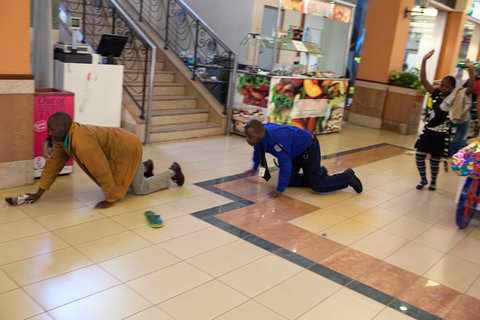Four men charged in connection with the Westgate shopping mall massacre in September have appeared in court in Nairobi.
Separately, it is being claimed that one of the gunmen once lived in a Kenyan refugee camp.
All four suspects have pleaded not guilty to the charges of "supporting a terrorist group," as well as entering Kenya illegally and obtaining false identification documents.
The Westgate attack on 21 September 2013, which left at least 67 people dead, was claimed by Somalia's al-Shabab rebels.
The four suspects, who are all ethnic Somalis, are Mohamed Ahmed Abdi, Liban Abdullah Omar, Adan Mohamed Dheq Ibrahim and Hussein Hassan Mustaffah. .
Communication with attackers alleged
Liban Abdullah Omar and Hussein Hassan Mustaffah are accused of knowingly supporting two men described as perpetrators of the attack. Adan Mohamed Dheq Ibrahim is accused of harboring the terrorists.
Kenya's state prosecutor Mwangi Waruhiu told DW's Nairobi correspondent James Shimanyula that some of the suspects were "communicating with the attackers before and during the attack," the others were "the ones who had given them a place to stay."
The four denied the charges through a Somali interpreter and defense lawyers are to apply for their release on bail on Tuesday. The case is to be heard in January 2014.
Udoto Olando, lawyer for Liban Abdullah, told DW his client "was accused of harboring people that he has never harbored.
Not the gunmen
None are accused of being the gunmen in the mall. All the gunmen in the Westgate attack – totalling just four, not the dozen that security forces had initially reported – are understood to have died during the four-day siege.
Interpol is assisting Kenya in trying to identify four bodies suspected to be the gunmen.
On Monday Kenyan security officials said a Westgate gunmen once lived in a refugee camp in northwestern Kenya that house more than 54,000 refugees. Two officials, who asked not to be named, said gunman Mohammed Abdinur Said had once lived on teh Kakuma refugee camp.
Twenty still missing
Witnesses in the mall described how the fighters stormed the crowded complex, firing from the hip and hurling grenades at shoppers and staff.
The Kenyan Red Cross has said some 20 people are still missing, and there are fears more bodies could be found in the wreckage of the mall.
The gunmen coldly executed scores of people, with witnesses recounting how in some cases they called out to those wounded, then shot them at close range.
Some of those charged were arrested in Kenya's northwestern desert refugee camp of Kakuma, a vast settlement home to over 125,000 refugees from across the region, including Somalia.
Defense lawyer Mbugua Mureith: wants bail for his clients
Detectives are continuing to investigate a possible link to Norway, with Ndegwa Muhoro, head of Kenya's Police Criminal Investigation Department, saying that a telephone call was made to Norway from the mall during the attack.
A Norwegian citizen of Somali origin is suspected of being one of the attackers, a 23-year-old named in media reports as Hassan Abdi Dhuhulow.
All the gunmen in the Westgate mall attack are believed to have died during the four day siege
After the attack, the Shebab threatened further attacks against Kenya, after Nairobi refused to pull its troops out of Somalia, warning that "rivers of blood will flow in Nairobi."
Kenya invaded southern Somalia to attack Shebab bases two years ago, and later joined the 17,700-strong African Union force deployed in the country.
The Westgate mall remains a crime scene, with part of its back section collapsed after a fierce fire broke out on the third day of the siege when bazooka rockets were fired at the gunmen by Kenya's defense forces.
In a separate development, a new agreement was signed on Sunday to encourage the nearly half a million Somalis inside refuge camps in Kenya to return home. One Kenyan official, Mutea Iringo, said insecurity was one reason Kenya wanted the refugees to leave.
Source: allAfrica.com



